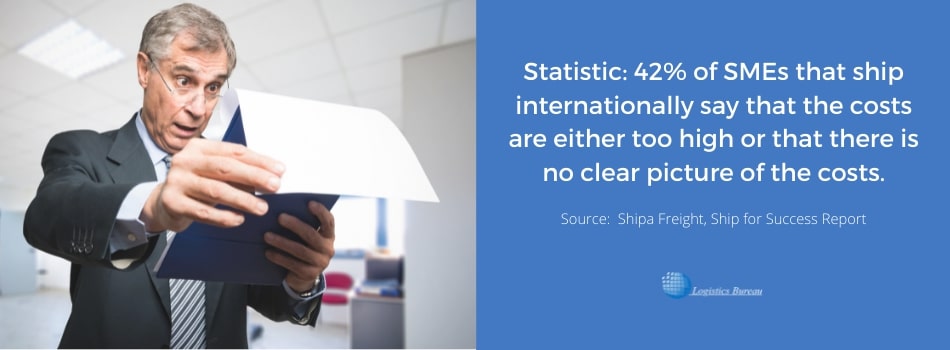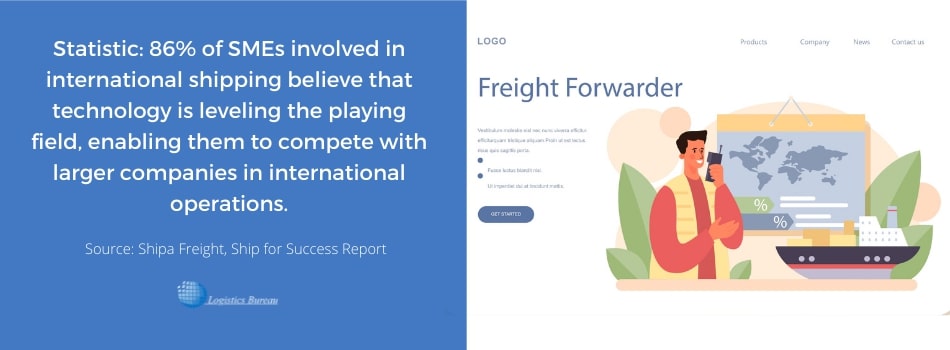It has never been easier, in general, for smaller companies to trade in international markets than it is today.
However, freight shipping is the one activity that presents significant barriers to overseas-market entry, as you may have discovered if your business is starting to look across international borders for its next step in expansion.
In this brief post, we’re going to set out some of the critical containerised-freight shipping challenges for small to medium-sized companies.
Our aim here, if you’re new to the world of commercial importing and exporting, is to help you know what to look out for and where/how to concentrate resources to gain traction against larger competitors in what is becoming an ever-more-competitive arena.
Container Shipping Can be Tough for SMEs
The years 2020 and 2021 have not been easy for any company engaged in shipping containerised freight internationally. Container shortages and sky-high freight rates have spared no enterprise, regardless of its scale.
However, even before the Coronavirus pandemic rocked the global trade environment, SMEs faced disproportionately greater challenges in containerised freight shipping than their larger brethren.
That’s a situation that has changed little in the last two years, although new technologies are beginning to make life easier for those companies that ship on a smaller scale.
Are you considering a transition or expansion into international trade for your enterprise? Perhaps you have already begun and are only now beginning to look at the shipping side of things? In either case, the following rundown of SME containerised-freight shipping challenges might help you see where you will need to place the most intense focus.
Challenge #1: High Costs and Confusing Pricing
The costs of shipping a container-load of freight have never been higher, and right now, the control of pricing is firmly in the hands of the liner companies. That’s a massive problem for SMEs, for example, that last year might have been paying $4,000 to $5,000 (USD) to ship a 40-foot container from Asia to North America, and now face rates of $20,000 and above.
As if astronomical freight rates are not enough, understanding the anatomy of freight quotes and invoices requires an in-depth knowledge of the shipping industry that’s missing in many smaller companies, leaving managers unsure of their actual costs and what they comprise.
To further compound the issue, some costs are incurred only in the event of problems arising at the ports of loading or discharge and are impossible to foresee when booking a shipment.
For example, if your company chooses to book its containerised-freight shipments with a freight forwarder (which often makes a lot of sense), your quote might include the fees for:
- Domestic transportation in the country of export
- The maritime shipping leg the country of export to the country of import
- The domestic transport in the country of import
Transshipment of containers or contents might be required within any of the above legs of the shipment, an activity that typically results in additional charges.
A Multitude of Cost Components
Aside from the segmentation of shipping itself, the cost of each segment be made up of several components, which might include:
- Terminal handling charges
- Export fees
- Documentation fees
Then there is the potential for demurrage or detention fees if a container is held up in a port or returned late to the shipping company, not to mention all the potential surcharges that shipping lines apply, such as bunker, low sulfur, and pirate surcharges.
Ultimately, the sheer number of pricing components, combined with the vagueness applied by some forwarders or shipping lines, make it very hard for managers to get a clear and accurate picture of freight costs.
Challenge #2: Finding a Suitable Logistics Partner
The international freight shipping industry has, for many years, harboured a bias towards large-scale beneficial freight owners, which typically means large companies. As a result, smaller companies can find it challenging to find a suitable partner—as in one that prioritises their interests as a priority.
Fortunately, this aspect of container freight shipping is slowly changing, primarily due to the emergence of digital freight forwarding platforms.
These providers, examples of which include Shipa Freight and iContainers, allow businesses of any size to acquire container space and enjoy a simplified process for obtaining quotes, booking their freight shipments, tracking their goods, and making their payments.
Challenge #3: The Complexities of Compliance
There are many rules, regulations, and requirements to comply with when shipping containerised freight. For example, export and import customs requirements must be met, including assessing duties and taxes and perhaps the need to apply for licenses or permits. Then there are the rules of maritime shipping, which become even more complicated if your freight includes hazardous materials.
Compliance with all these requirements and managing the associated documentation has always presented something of a minefield, and a significant hurdle for SMEs engaged in international trade.
Here too, the new breed of tech-driven freight forwarders is beginning to ease the pain by providing platforms that walk shippers through the compliance and documentation requirements as part of the booking process. Nevertheless, recent studies reveal that more than 50% of SMEs cite compliance and documentation as presenting a significant challenge.
Challenge #4: In-house Expertise Difficult to Acquire
When the previous three challenges discussed here are put together, it’s not hard to see the necessity of in-house international logistics and freight forwarding expertise for smaller companies navigating the complexities of containerised-freight shipping.
That internal expertise is especially vital for businesses that don’t fall into the category of large enterprises but may still ship several thousand containers per year.
Such businesses can’t afford to put all their freight management in the hands of forwarders or other logistics partners, even if that’s where they physically put their freight. Instead, they need internal specialists to make sense of the costs, cover compliance needs, and of course, to manage the relationships with partners, suppliers, and customers.
To Hire or to Train, That is the Question
Unfortunately, as with many other logistics sectors, talent in the FCL and LCL shipping niches is not overly abundant right now. Therefore, for those SMEs that desperately need it, the challenge is to attract such talent or, otherwise, recruit more general logistics professionals and then train them as international freight specialists.
The latter option can become something of a chicken and egg situation. After all, before you can train generalists as international freight specialists, you need people with the appropriate expertise and credentials to develop and deliver the training.
Of course, you can seek external help with this, which would come at a cost but might give you the start you need. In case that’s an option you’re considering, we’ll conclude with a quick look at how a supply chain consulting company might support you in your quest for more effective container-freight management.
The Value of External Assistance with Container Freight Shipping
If you own or run a small or medium-sized enterprise and have difficulty managing containerised freight shipping, it might make sense to look externally for help. A reputable supply chain consulting firm can assist you with all of the challenges we’ve briefly covered in this article.
From finding a suitable logistics partner to understanding costs, ensuring compliance, and training staff to become freight shipping experts, professional consultants can aid and support you.
Along the way, they can help your organisation gain the knowledge, skills, and expertise you need to enjoy more success with international trade by deftly navigating the complexities of international container-freight shipping.
Of course, you would not want to rely on external consultants as a long-term solution since the cost would be prohibitive. However, by enlisting help to evaluate your processes and relationships with logistics partners, optimise them, and transfer knowledge to your team, that period of paid support should position you to ship international freight more successfully—and with greater confidence—in the future.
At Logistics Bureau, we field an expert team of supply chain and logistics consultants, several of whom specialise in helping clients with container shipping.
An initial consultation call with one of those specialists is FREE, will take only around 15 minutes of your time, and imposes no obligation. So schedule your call now and learn how we can help you enjoy more successful container freight shipping.
Editor’s Note: The content of this article was originally published on Logistics Bureau’s website dated December 7, 2021, under the title “Why Containerised Freight Shipping is Daunting for SMEs“.








